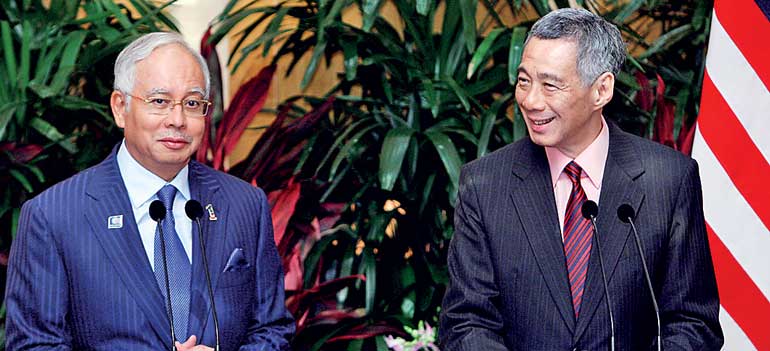Sunday Feb 22, 2026
Sunday Feb 22, 2026
Tuesday, 16 January 2018 00:00 - - {{hitsCtrl.values.hits}}

KUALA LUMPUR/SINGAPORE (Reuters): The leaders of Malaysia and Singapore are expected to discuss plans for a high-speed rail project linking their countries during summit talks on Tuesday, as a deadline to award the multi-billion dollar project nears.
The high-speed rail valued by analysts at about $17 billion is the biggest project undertaken by the Southeast Asian neighbours in recent years, and will test a relationship that has been frosty since the end of the colonial era in the 1960s.
It also could expose broader tensions over China’s growing influence in the region, as the two leaders must choose between competing bids from Chinese and Japanese rivals, as well as European and South Korean firms.
A joint tender for the company that would build, operate and finance the trains and the rail assets closes on June 29, and a decision is expected by the end of the year.
“It (the preferred bidder) could be a source of difference,” said Associate Professor Ja Ian Chong of the Department of Political Science at National University of Singapore.
“But the issue is whether this difference is something where a compromise can be found and I think that’s very hard to tell at this point.”
Given his close ties to Beijing, rejecting a Chinese bid would be tough for Malaysian Prime Minister Najib Razak, who will hold talks with his Singaporean counterpart, Lee Hsien Loong, in Singapore on Tuesday.
Beijing has pumped billions into Malaysia over the last two years, as Najib looked to tackle massive government debt and appease voters ahead of national elections this year.
Najib’s government handed a $13 billion rail project to China last year that links peninsular Malaysia’s east and west.
Singapore, on the other hand, has had difficulties recently in its relationship with China over Taiwan and the disputed South China Sea islands.
China Railway Corporation would lead a consortium of Chinese companies bidding for the massive project, one diplomatic source in Kuala Lumpur told Reuters.
For Japan, JR East would head a consortium that includes Sumitomo Corporation, Hitachi Ltd, Mitsubishi Heavy Industries and NEC Corp, the source said.
South Korea’s consortium would include Hyundai Rotem Co and Hyundai Engineering and Construction, another source familiar with the bidding said.
China’s key competitive advantage is its lower construction cost, said Corrine Png, the CEO of transport research firm Crucial Perspective.
Japan, on the other hand, has a long record of building and operating high-speed rail and wants to counter Chinese influence in Southeast Asia, which has been backed by mega-projects under Beijing’s Belt and Road Initiative.
About 90 percent of the rail network is in Malaysia, and Najib’s government has agreed to pay for its share of the line itself. Yet to be decided, however, are other costs like building and maintaining the rolling stock.
“The formula is, whatever you need to build from your station right up to the international boundary, it’s your cost,” said Abdul Rahman Dahlan, a minister in Najib’s government.
Discussions between officials from the two countries had gone smoothly so far, he added.
“It’s moving, our timeline is on. I don’t see any big issues at the moment,” he said, when asked about the project’s timeline.
Singapore was part of Malaysia after the end of British colonial rule but they separated acrimoniously in 1965, clouding diplomatic and economic dealings for decades.
The countries have wrangled previously over wider political issues as well as smaller matters like water supply and road tolls, but those frosty ties have thawed under Najib and Lee.
The rail project is a symbol of these closer relations. With a top speed of over 300 kph (186 mph), it is scheduled to be completed by 2026 and will cut the travel time between Kuala Lumpur and Singapore to about 90 minutes from the current four- to five-hour road journey.
Malaysia said on Sunday that the two nations will sign an agreement for a rapid transit system linking the busy crossing between Malaysia and Singapore during the leaders’ retreat.